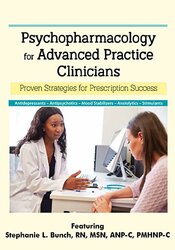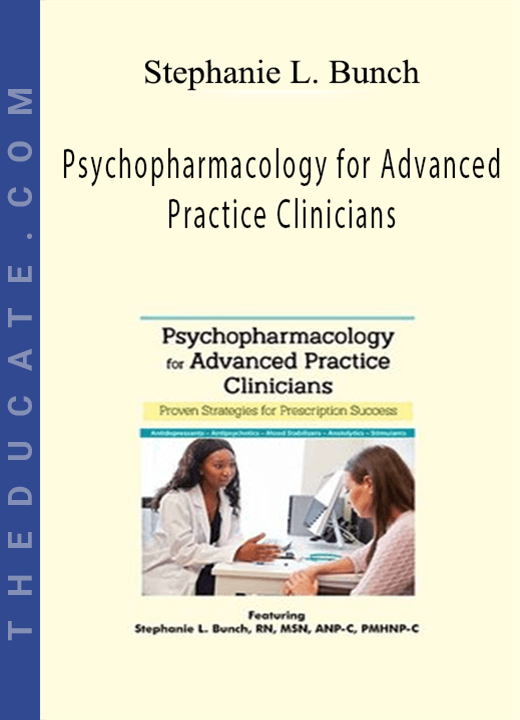Description

-
Stephanie L. Bunch – Psychopharmacology for Advanced Practice Clinicians: Proven Strategies for Prescription Success
- Faculty:
- Stephanie L. Bunch
- Duration:
- Full Day
- Format:
- Audio and Video
- Copyright:
- May 14, 2019
Description
Psychiatry is one of the most challenging areas of medicine, secondary to the subjective nature of the specialty. As clinicians, we have no objective data to base our course of treatment on.
Psychopharmacology and psychotherapy are our best options in terms of treatments and therapy is only successful if the patient is committed to attending every session, completing their homework, and willing to make the necessary life changes to improve their mental health. Medication can be very helpful in terms of alleviating mental health symptoms; however, choosing the right medication and/or combination of meds is crucial to achieving successful outcomes. Secondary to the psychiatry shortage, providers in other specialties find themselves treating mental health patients, which can present additional challenges.
This recording will arm you with a valuable update on the different classes of psychiatric medications and facilitate a deeper level of understanding in terms of how these medications work on their respective neurotransmitters and how they work in conjunction with one another. It is uncommon for mental health patients to be on only one medication, as a combination of medications is often required to reach the desired level of improvement.
After this course, you will be able to identify effective medication regimens for patients based on their psychiatric history and presenting symptoms, ultimately contributing to quality of life improvements in patients with mental health conditions.
Handouts
| Manual – Psychopharmacology for Advanced Practice Clinicians (16.1 MB) | 110 Pages | Available after Purchase |
Outline
Antidepressants
- The many facets which impact depression such as neurotransmitter imbalances, life events, and environmental factors
- History of antidepressants, in terms of safety and efficacy of treatments
- Classes of antidepressants – MAOIs, TCAs, SSRIs, SNRIs, SDRIs, other antidepressants, and serotonin modulators
Antipsychotics
- Targeted neurotransmitters – DA, mechanism of action, DA pathways, D2 and 5Ht2A – why is this important?
- Typical vs. atypical – what are the differences and how do we choose them?
- Adverse effects
- Off label indications
- Specific benefits of the class
Mood Stabilizers
- Targeted neurotransmitters/Mechanism of action
- Efficacy in treatment
- Adverse reactions
- Safety – Importance of compliance and monitoring
- Off label indications
- Best in practice pearls
Anxiolytics
- 2nd line treatment vs. 1st line treatment – and reasons these might not be used as first line
- Targeted neurotransmitters/Mechanism of action
- Cautions and safety concerns associated with this class
- Adverse effects
- Safety – addiction and withdrawal
Stimulants
- Classes of ADHD drugs and how they differ
- Neurotransmitters involved/Mechanism of action
- Caution associated with controlled substances
- Safety in children and use in adults
Critical Considerations for Psychopharmacology Treatment
- Increasing risk – when patients combine psychotropic medications with alcohol and/or illicit drugs
- Challenging symptoms to treat, such as TBI and autism
- Ruling out medical conditions that mimic psychiatric conditions
- Importance of a detailed history and review of symptoms
Enlightening Case Studies
- Depression
- Schizophrenia
- Bipolar
Faculty
Stephanie L. Bunch, RN, MSN, ANP-C, PMHNP-C Related seminars and products: 2
Stephanie L. Bunch, RN, MSN, ANP-C, PMHNP-C, works in a large private practice in Lansing, MI, providing clinical services to children, adolescents, and adults with psychiatric disorders, including ADHD, Bipolar Disorder, Depression, Anxiety, Obsessive-compulsive tendencies, Schizophrenia, Autism Spectrum Disorder, Traumatic Brain Injury, PTSD, and Personality Disorders. She has achieved considerable success treating these conditions. This success has largely resulted from the development of a structured model of care that includes a significant focus on clinical and background histories, identifying psychosocial stressors, and evaluating prior medical and psychiatric diagnoses (and treatment regimens associated with these conditions). This approach and model of medical management is essential to the effective delivery of psychiatric medications to this population.
From a clinical perspective, Stephanie has worked in a myriad of settings, including emergency medicine, primary care, and psychiatry, within a large urban hospital, community-based practice, clinics, and in a private-practice setting. Her transition from primary care to psychiatry evolved as a means of providing effective treatment for a growing population of underserved patients with psychiatric disorders.
Stephanie’s commitment to her specialty is evident. She completed a post-graduate degree specializing in psychiatry at Johns Hopkins University in Baltimore, MD, earned her Psychiatric Mental Health Nurse Practitioner certificate, and is a requested presenter, sharing her expertise with multidisciplinary healthcare audiences throughout the country.
Speaker Disclosures:
Financial: Stephanie Bunch has an employment relationship with Par Rehab Services. She receives a speaking honorarium from PESI, Inc.
Non-financial: Stephanie Bunch is a member of the American Association of Nurse Practitioners.







3 reviews for Psychopharmacology for Advanced Practice Clinicians: Proven Strategies for Prescription Success – Stephanie L. Bunch
There are no reviews yet.